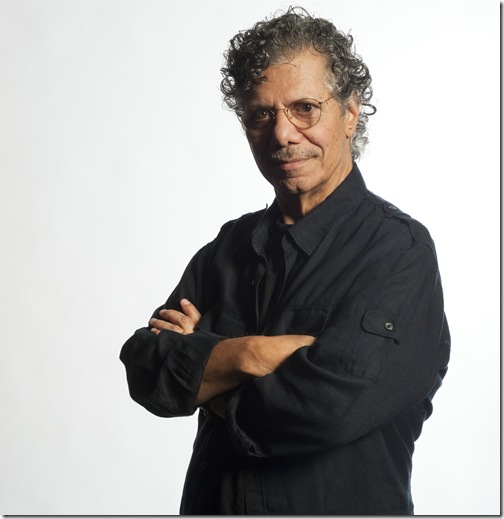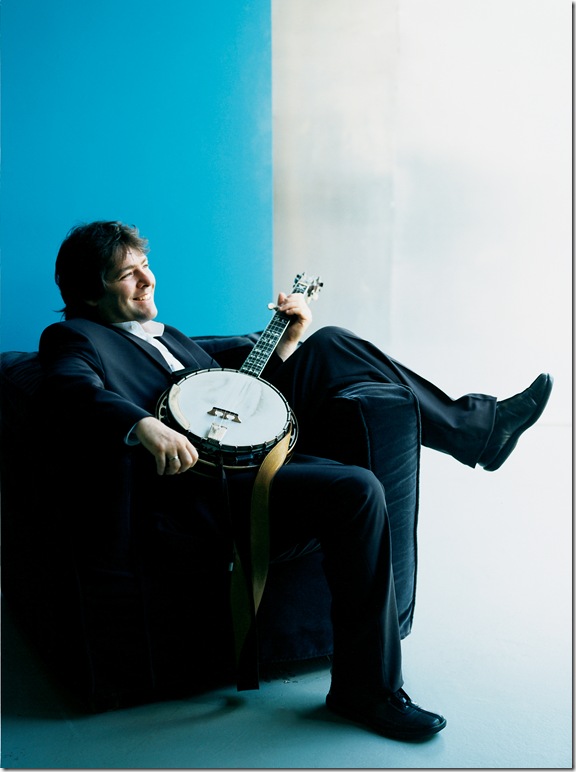When iconic 71-year-old jazz keyboardist Chick Corea won two Grammy Awards in February, it ran his career total to 20, tied for seventh all-time.
Banjoist Bela Fleck is a comparative pup in both age (54) and Grammys (with “only” 15), but he’s been nominated in more different categories — bluegrass, jazz, country, pop, classical, folk, spoken word, composition, and arranging — than any other artist in the 55-year history of the awards.
You’d be hard-pressed to find another touring duo with more combined Grammys, but that’s hardly the reason they’ve reconvened to hit the road again, even with no new material and almost six years removed from their outstanding 2007 duo CD The Enchantment.
“I missed playing with Chick,” Fleck says, “and it’s nice to know that he’s into doing it again. One presenter made a nice offer, and we both agreed. Which led to the question of what else we could do together around that time, and then other presenters jumped on it. We’re already looking for other times to tour together to deal with the demand. There are so many places we never got to during the year we toured.”
The Enchantment, and its subsequent roadwork, featured new compositions by both participants; the Ary Barroso/Sidney Russell standard Brazil, and a selection from the back-catalogs of both Corea (Children’s Song No. 6) and Fleck (Sunset Road). The result was an inimitable blend of jazz, bluegrass, Latin, folk, fusion and classical music that was highly improvised, both during the CD’s live-in-the-studio recording format and in concert.
“Every night is totally different,” Fleck says. “We improvise a ton.”
Is there an estimated percentage versus structured passages?
“We’d need an improvisation Geiger counter manned by a soothsayer to determine that,” quips Corea.
The reason they both speak of such prior touring as if it were yesterday is not only because of long memories, but because they’ve since listened to the recordings that documented it.
“We did record our past tour,” Fleck says, “and I will say, it would make a great live CD.”
The banjoist says current audiences should expect mostly material from The Enchantment. His counterpart, however, holds his cards.
“We’re going to rehearse at my house a couple days before our first concert,” says Corea of his Clearwater residence, and the tour’s March 20 debut in Gainesville. “So I’m not sure what we’ll play yet.”
Their differing answers may hint at Corea’s throw-caution-to-the-wind improvisational skills, and the younger Fleck’s reverence toward it. Each came to this point in their career with an open-mindedness toward listening that has translated into encompassing nearly every musical style imaginable, but it was the younger Fleck who was initially influenced by his duo partner.
Who hasn’t been? From 1968-1970, Corea worked with legendary trumpeter Miles Davis on albums like Miles in the Sky, In a Silent Way and Bitches Brew, resulting in him also recording and/or touring with fellow keyboardists Joe Zawinul, Herbie Hancock and Larry Young; saxophonist Wayne Shorter, guitarists John McLaughlin and George Benson, bassists Ron Carter and Dave Holland, and drummers Tony Williams, Jack DeJohnette and Lenny White.
Fleck, who studied French horn and chorus in high school in his native New York City, didn’t even own a banjo until 1973. But he bought one after hearing Corea’s future standard Spain (from the initial Latin-tinged version of his band Return To Forever’s 1972 LP Light as a Feather), plus seeing the band in concert the following year, all of which made him realize the banjo could work in a jazz context.
After high school, Fleck had moved to Boston, and the 20-year-old banjoist released his bluegrass-based debut CD Crossing the Tracks in 1979. By then, the Massachusetts-born Corea had already worked with Stan Getz, Sarah Vaughan and Dizzy Gillespie; released his first dozen solo albums, and turned Return To Forever into a fusion juggernaut. No wonder, then, that Fleck still approaches working with Corea with some degree of nervousness, even after the duo’s initial recording and touring.
“Playing with a hero of mine like Chick, and at the level he’s at musically, there’s no way I wouldn’t be nervous,” says Fleck. “But I’m also curious to see what new things we both can bring to the collaboration, now that we’ve had a few years’ break from it. In my experience, coming back to something with a fresh perspective can really move the music to a new level.”
“I think my confidence is better now, and part of it is all the shows we did together, and the ability to listen back and see that I wasn’t embarrassing myself. Another part is that I played in more of a jazz context last year with [pianist] Marcus Roberts’ trio. After all the shows we did, my harmonic palette seemed to have opened up. And I wonder if it will impact my approach to playing with Chick. When I can do things that interest him, it stimulates some phenomenal piano playing.”
True to form, and in a microcosm of what’s made him special for five decades, Corea hears things differently.
“To me, Bela never seemed anything but totally confident,” he says.
Both musicians have more reason to be confident than most. During the 1980s, Corea recorded Mozart piano concertos and alternated between his self-titled Elektric and Akoustic bands, among others. Fleck honed his monstrous bluegrass chops through the decade with mandolinist/violinist Sam Bush’s progressive New Grass Revival band, then formed the act that would bring his name into public consciousness.
Bela Fleck and the Flecktones’ “blu-bop” sound blended his banjo with the athletic fusion bass playing of Victor Wooten; brother Roy “Futureman” Wooten on an electric drum/guitar synthesized hybrid called a “Drumitar,” and the equally impressive keyboard and diatonic harmonica playing of Howard Levy.
It was as if Earl Scruggs jammed with Weather Report. After three stellar CDs of the previously unheard mix of banjo melodies, harmonic keyboards, and airtight rhythms ranging from swing to funk between 1990 and 1992, Levy chose to spend more time at home as the increasingly worldwide fusion phenomenon toured further and more often.
One of Fleck’s first post-Flecktones forays was his 1994 release Tales From the Acoustic Planet — which featured Corea as a guest on three tracks. The keyboardist was also one of several guests on the Flecktones’ 1996 concert recording Live Art before they hired saxophonist Jeff Coffin as a permanent fourth member. Coffin played until the original Flecktones lineup reunited to produce the 2011 CD Rocket Science and a subsequent tour.
That was one of countless projects since The Enchantment for Fleck — who’s branched into orchestral playing and, if anything, may have produced even more post-2007 musical tributaries than Corea.
“It’s been a rich period for me,” Fleck says, “especially since the Flecktones finished their year together last May. We’ll reconvene in a few years, assuming that everyone is up for it at that time. I will be! I’ve been playing in 10 different situations, so I’ve been busy. Playing my banjo concerto with great symphony orchestras has been particularly satisfying.”
Corea hasn’t rested in recent years, either, impressively co-leading the all-star Five Peace Band with McLaughlin; re-forming Return To Forever, and re-kindling his 40-year-old duo with vibraphonist Gary Burton. Corea’s latest two Grammys were for that duo’s 2012 CD Hot House, which also earned Burton his sixth and seventh awards.
“Working with such great musicians always helps with your next project,” Corea says. “I have always been very fortunate to play with the best musicians in the world, and the interaction with them continues to impact me and inspire me to the next level. Right now I’m focusing on my new band, The Vigil.”
Some of Fleck’s other post-2007 exploits point toward a more worldly banjo approach. His outstanding 2008 documentary film Throw Down Your Heart, and its soundtrack, featured Fleck tracing the banjo’s roots back to Africa through his playing and interaction with musicians in Uganda, Tanzania, The Gambia, and Mali.
“I loved my time with the great African music makers,” Fleck says. “It gives me loads of more colors to paint with when I’m playing. I just got back from a month in India, and playing with musicians there has had a similar effect. Just more toolbox materials and ideas to access spontaneously.”
All of which may point toward his possible live CD with Corea eventually being culled from current rather than past tour dates, with the upside being that the duo could tour once again after its release.
“We’ve discussed possibly putting out a recording of our mobile live performances,” Corea says.
With another fruitful decade, the keyboardist may have a chance at eclipsing all-time Grammy leader Sir Georg Solti, who conducted the Chicago Symphony Orchestra for 22 years and has 31 awards. And perhaps one of Corea’s main competitors for that top spot will prove to be Fleck.
For now, though, Corea returns from a European duo tour with the 70-year-old Burton to embark on one through the United States, this time with a duo partner from the next generation. But the two have just the right amount of similarities, plus different influences, to engage each other in the intimate yet spirited musical conversation that a great duo can provide. As much as the ahead-of-his-years banjoist reveres his iconic keyboard elder, Corea also sees a perfect foil in Fleck.
“He’s a wonderful friend and a magnificent musician,” says Corea, “and I treasure our musical relationship.”
Bela Fleck and Chick Corea perform at 8 p.m. Thursday in Dreyfoos Hall at the Kravis Center, 701 Okeechobee Blvd., West Palm Beach ($20-100, 561-832-7469 or 800-572-8471).

